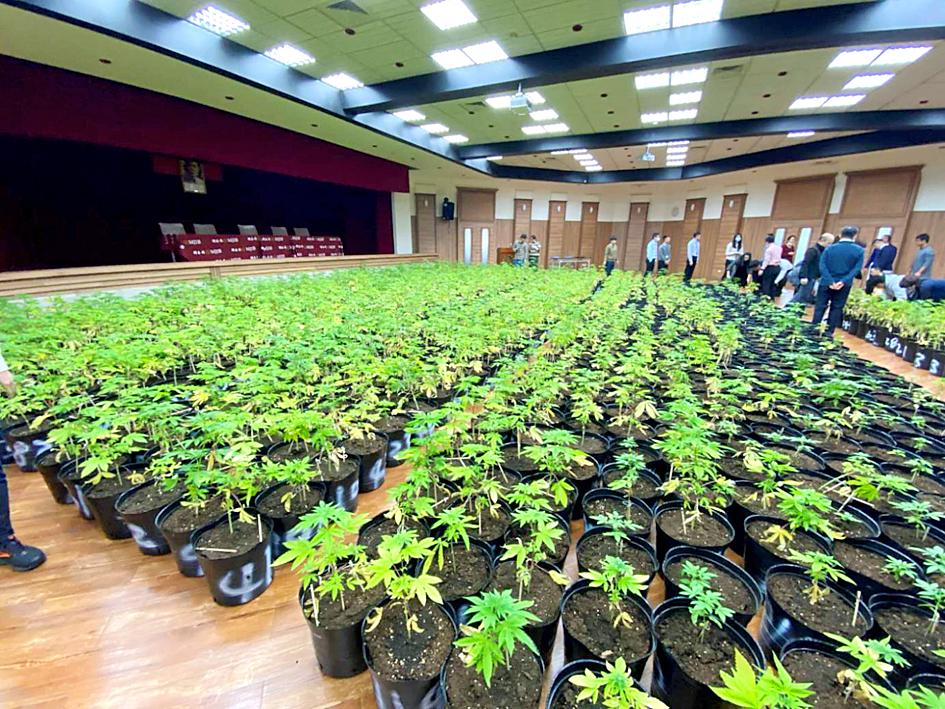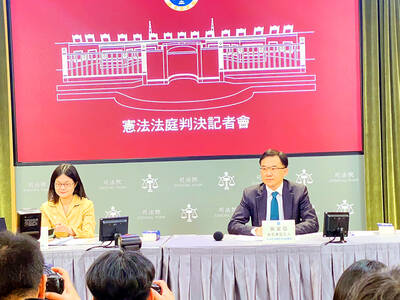Minister of Justice Tsai Ching-hsiang (蔡清祥) yesterday presented the results of a raid on an illegal cannabis farm in Hsinchu County, where police seized more than 1,600 cannabis plants with an estimated street value of NT$500 million (US$17.76 million).
It was the largest cannabis seizure in Taiwan, officials said.
Speaking at a news conference at the Ministry of Justice Investigation Bureau Taipei Field Station, Tsai reiterated his ministry’s tough stance against illegal drugs and said it would continue to crack down on cannabis.

Photo courtesy of the Ministry of Justice
Police on March 19 raided a greenhouse in the hills of Guanhsi Township (關西), a bureau official said.
Two men, surnamed Chiu (邱) and Yu (虞), were detained on suspicion of running the greenhouse, and 1,608 potted cannabis plants were seized.
The bureau in a statement touted the operation as highly successful.
It praised bureau officials “for working from early morning to late night on that day” to search the site, gather evidence and transport the seized plants to Taipei for investigation in the biggest domestic cannabis seizure.
An investigation has been launched into the criminal ring and its alleged mastermind, who is suspected of providing financial backing and instructions to Chiu and Yu, the bureau said.
The bureau said it waited until yesterday to announce the bust, as it was one day after April 20, which is an annual day of celebration for marijuana users.
Tsai and bureau officials at the news conference presented seized materials, including dried cannabis leaves and buds, machines and equipment for desiccating, cultivating and watering the plants, as well as lighting equipment.
They also displayed a video showing rows of seized potted cannabis.
“There are people in Taiwan advocating for the decriminalization of cannabis, but this does not conform to the conditions in our nation... Cannabis is still a Category 2 narcotic under the law and authorities will crack down against it,” Tsai said, referring to the Narcotics Hazard Prevention Act (毒品危害防制條例).
“It is our resolve to combat illegal drugs and we will not accept such a suggestion [decriminalization of cannabis]. Judicial investigators will continue to fight against cannabis smuggled from abroad or grown within our nation,” he added.
A group of more than 1,500 people on Saturday last week rallied outside the legislature to demand that the government decriminalize cannabis and legalize marijuana for medical use. The event drew a heavy police presence and sniffer dogs.
Officials at yesterday’s news conference told reporters that “each cannabis plant has a street value of NT$300,000 when dried and sold for consumption to users.”
The 1,608 plants seized at the raid would amount to nearly NT$500 million, which is “a record haul” for the bureau, they said.
However, marijuana advocacy group Green Sensation has in the past few years disputed the estimated values presented by officials, saying they are highly unrealistic and overly exaggerated.
It has accused the bureau and judicial investigators of announcing higher street prices to take more credit and gain higher performance citations, and for informants to claim higher monetary rewards for tip-offs.

The US government has signed defense cooperation agreements with Japan and the Philippines to boost the deterrence capabilities of countries in the first island chain, a report by the National Security Bureau (NSB) showed. The main countries on the first island chain include the two nations and Taiwan. The bureau is to present the report at a meeting of the legislature’s Foreign Affairs and National Defense Committee tomorrow. The US military has deployed Typhon missile systems to Japan’s Yamaguchi Prefecture and Zambales province in the Philippines during their joint military exercises. It has also installed NMESIS anti-ship systems in Japan’s Okinawa

TRAGEDY STRIKES TAIPEI: The suspect died after falling off a building after he threw smoke grenades into Taipei Main Station and went on a killing spree in Zhongshan A 27-year-old suspect allegedly threw smoke grenades in Taipei Main Station and then proceeded to Zhongshan MRT Station in a random killing spree that resulted in the death of the suspect and two other civilians, and seven injured, including one in critical condition, as of press time last night. The suspect, identified as a man surnamed Chang Wen (張文), allegedly began the attack at Taipei Main Station, the Taipei Fire Department said, adding that it received a report at 5:24pm that smoke grenades had been thrown in the station. One man in his 50s was rushed to hospital after a cardiac arrest

ON ALERT: Taiwan’s partners would issue warnings if China attempted to use Interpol to target Taiwanese, and the global body has mechanisms to prevent it, an official said China has stationed two to four people specializing in Taiwan affairs at its embassies in several democratic countries to monitor and harass Taiwanese, actions that the host nations would not tolerate, National Security Bureau (NSB) Director-General Tsai Ming-yen (蔡明彥) said yesterday. Tsai made the comments at a meeting of the legislature’s Foreign Affairs and National Defense Committee, which asked him and Minister of National Defense Wellington Koo (顧立雄) to report on potential conflicts in the Taiwan Strait and military preparedness. Democratic Progressive Party (DPP) Legislator Michelle Lin (林楚茵) expressed concern that Beijing has posted personnel from China’s Taiwan Affairs Office to its

‘ILLEGAL RULING’: The KMT and the TPP slammed the Constitutional Court judgement, saying it contravened the law and was trying to clear the way for a ‘green dictatorship’ The Constitutional Court yesterday ruled that amendments to the Constitutional Court Procedure Act (憲法訴訟法) passed by the Legislative Yuan last year are unconstitutional, as they contravene due legislative process and separation of powers. The Legislative Yuan on Dec. 20 last year passed amendments stipulating that no fewer than 10 grand justices must take part in deliberations of the Constitutional Court, and at least nine grand justices must agree to declare a law unconstitutional. The Executive Yuan on Jan. 2 requested that lawmakers reconsider the bill, but the Legislative Yuan, under a combined majority of Chinese Nationalist Party (KMT) and Taiwan People’s Party